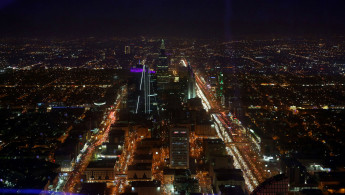Saudi spending to hit record high despite drop in oil prices
Saudi Arabia's expenditures will hit a record-high in 2019, even as declining oil prices force the kingdom to adopt austerity measures, according to figures announced by King Salman on Tuesday.
The monarch said that the Saudi government expects revenue to increase by more than nine percent to hit $260 billion, leaving a projected deficit of $35 billion - less than previous years.
Total revenue in 2018 reached $239 billion, with expenditures of $274.5 billion.
"This budget is a continuation of the government's policy of focusing on fundamental citizen services and the development of government services," the king said at a government meeting that included ministers and his son, Crown Prince Mohammed bin Salman.
Saudi Arabia has been grappling with a deficit since oil prices first plunged in 2014. It needs oil at around $70 a barrel to balance its budget, but the price of oil continued to tumble after hitting a 14-month low on Monday.
Benchmark US crude dropped to a little more than $49 per barrel Tuesday. Brent crude, used to price international oils, dipped to $58.70 per barrel.
As one of the world's largest oil exporters, the Saudi government is working to diversify its revenue and wean its economy off its reliance on the natural resource.
Non-oil revenue has increased in recent years, but the state continues to rely heavily on oil for its domestic and international spending.
The Finance Ministry said oil revenues are expected to reach $176.5 billion in 2019 - about 68 percent of state revenue -compared to $162 billion in 2018.
Research firm Capital Economics said this year's Saudi budget seems to be relying on optimistic assumptions for oil prices to rise to almost $80 per barrel.
The annual Saudi budget is watched closely because it offers one of the clearest indicators of whether the kingdom is on track with its ambitious Vision 2030 plans.
The killing of Saudi writer Jamal Khashoggi, who had written critically of the crown prince in The Washington Post, has called into question Prince Mohammed's ability to attract foreign investors to help underwrite his plans. Khashoggi was killed and dismembered inside the Saudi consulate in Istanbul by agents close to the crown prince.
A report by US intelligence firm Stratfor said that if growth only comes from heavy state spending, rather than private sector activity or higher levels of consumption, Saudi Arabia's plans to diversify the economy have little chance of success in the near term.
Saudi Arabia only succeeded in attracting $1.4 billion in 2017, a figure that Stratfor said trails a number of poorer countries in the Middle East.
"Crown Prince Mohammed bin Salman's ever-shifting reputation is a direct driver of this uncertainty, and questions about the rule of law, security of investments and the stability of the government abound," Stratfor said.
Investors were also rattled last year when the crown prince oversaw the arrest of top princes, officials and businessmen in an alleged anti-corruption campaign shrouded in secrecy. The sweep netted more than $106 billion in financial settlements.
Finance Minister Mohammed al-Jadaan said Tuesday the state has collected $13.3 billion from those settlements.





 Follow the Middle East's top stories in English at The New Arab on Google News
Follow the Middle East's top stories in English at The New Arab on Google News
![Both Hamas and the Palestinian Authority welcomed the ICC arrest warrants [Getty]](/sites/default/files/styles/image_330x185/public/2024-11/GettyImages-2178351173.jpg?h=199d8c1f&itok=TV858iVg)

